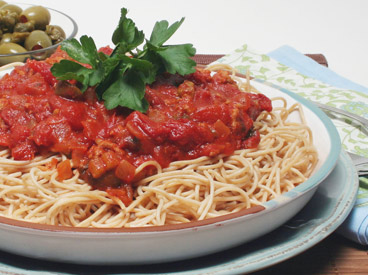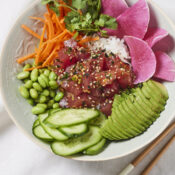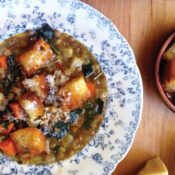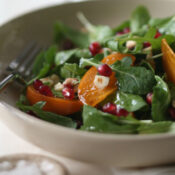Most people associate pasta with Italian cuisine, but this main dish has a decidedly Spanish flair. Saffron, a popular spice in many Spanish dishes, infuses an earthy, hay-like flavor and beautiful yellow-orange color. Saffron is the dried tiny threadlike strands of the fall flowering crocus, also known as the saffron crocus—a member of the iris family. Although it’s the world’s most expensive spice by weight, very little is needed to flavor and color food.
Spanish cuisine is also ripe with olives. Note that if seasoning with salt, go a little lighter because olives contribute to the saltiness of the sauce as do the capers. The capers, which are the unripened, pickled flower buds of a prickly perennial plant native to the Mediterranean and some parts of Asia, round out the Latin flavor with their tangy, lemony essence.
Add your favorite green salad and you have a complete, nutritious meal featuring an old favorite—spaghetti—in a new Spanish style.
Spanish Spaghetti
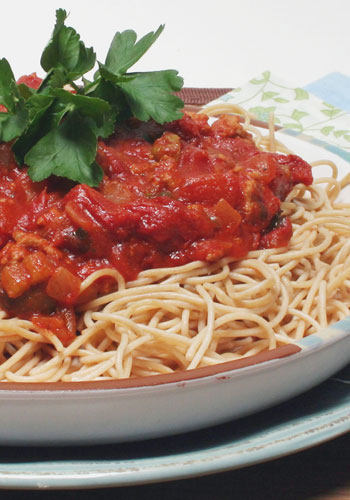
Makes 6 servings.
Ingredients
- 1 tablespoon extra virgin olive oil
- 2 medium yellow onions, chopped
- 1 large stalk celery, cut into 1/4-inch pieces
- 5 cloves garlic, minced
- ¼ cup chopped sundried tomatoes
- 8 ounces ground turkey (lean ground beef may be substituted)
- 2 (14.5-ounce) cans no salt added diced tomatoes
- 2 (6-ounce) cans tomato paste
- ½ cup water
- ¼ teaspoon red pepper flakes or to taste
- Salt and ground black pepper to taste
- 1 teaspoon dried oregano
- ¼ teaspoon crushed saffron threads, optional*
- ⅓ cup pimento stuffed queen olives, coarsely chopped (black olives may be substituted)
- 2 teaspoons capers, rinsed
- ¼ cup chopped fresh parsley, divided
- 8 ounces whole-wheat angel hair pasta
*Tip: Saffron is also available in powdered form. Be careful if buying the powdered variety because it is sometimes combined with turmeric or other less expensive substances. The powdered spice also loses its flavor more quickly than the threads. You can recognize good quality threads because they are bright red but have a dark shade with tips that have a slightly lighter shade, indicating that they are natural and have not been dyed to look darker. Some threads include a small amount of yellow, which usually means that they are not as strong.
Saffron is very sensitive to heat and light, so it should be stored in a cool, dark, and dry location. High humidity can cause it to smell musty and make it age faster. If stored properly, it can last for several years. Before cooking, place saffron in small bowl and add 1 to 2 tablespoons hot water. Let it sit until dissolved, about 20 minutes, before using.
Directions
- In large pot, heat oil over medium-high heat. Add onions and celery and sauté for 4 minutes.
- Add garlic and sun dried tomatoes and sauté 2 minutes. Add turkey and sauté 6-8 minutes, until thoroughly cooked and beginning to brown.
- Stir in diced tomatoes and tomato paste. Add water-use less for thicker sauce. Mix gently until well combined.
- Sprinkle in red pepper, salt, pepper, dried oregano, saffron, olives, capers and half the parsley. Cover and bring to a boil.
- Uncover and reduce heat and let sauce simmer for at least 15 minutes, stirring gently and fairly frequently. Meanwhile, cook paste al dente according to package instructions. Set aside.
- Either add pasta to sauce and combine or rinse pasta with hot water and place on serving dishes and top with sauce. Sprinkle with remaining parsley. Serve.
Nutrition Facts
Per serving
Calories: 330
Total fat: 7 g
Saturated fat: 1.5 g
Carbohydrate: 54 g
Fiber: 10 g
Protein: 16 g
Sodium: 490 mg
Become a Saturday Evening Post member and enjoy unlimited access. Subscribe now
